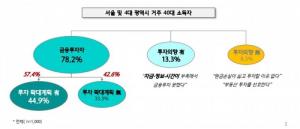It was found that 58% of financial assets in their 40s living in large cities were deposits and savings, and only 24% of financial investments such as stocks and funds were.
It was found that the total assets of the 40s averaged 410 million won, and the total loan balance was 80 million won on average.
On the 16th, Hana Financial Group’s Centennial Happiness Research Center published a’Lifetime Financial Report-How to Live in Korea’s 40s (Money)’ on the 16th. This is the content of an online survey in November of last year targeting 1,000 income earners in their 40s residing in four major metropolitan cities (Busan, Daegu, Daejeon, and Gwangju).
The center said, “As the asset management landscape is rapidly changing due to the recent Corona 19 pandemic, the central axis of the Korean economy and households, in their 40s, has also increased interest in financial investment. I saw it.’

◇ 57% of financial investors in their 40s “I will increase the size of investment in the future”
According to the report, the average financial assets of the 40s living in Seoul and the four metropolitan cities is 70 million won, and 28% of them have ‘100 million won or more’.
Deposits accounted for 57.7% of financial assets in the 40s, and financial investment products such as stocks (15.6%), other financial investments (6.5%), and bonds (1.5%) accounted for 23.6%.’
It was found that the’money move’, which moves money in the 40s to’investment’, continues.
Of those in their 40s, 78.2% were financial investors who already owned stocks, bonds, and funds, and more than half (57.4%) of them said they plan to further increase their financial investment in the future. Even if they were not financial investors, 61.0% thought that they will start investing if conditions allow, such as when the lack of funds, time, and information is resolved.’
The expansion of financial investment in the 40s has been remarkable in the past 1-2 years.
Among financial investors, 43.9% said they have expanded their investments in the last 1-2 years, and 15.0% said they started investing for the first time in the last year.
When asked the reason for expanding financial investment, the most common answers were’as the low interest rate persists’ and’because it becomes difficult to raise money without investing.’
The next many answers were’as the price of housing (real estate) increases’ in the early and mid-40s, and’because household income will not increase significantly’ in the late 40s.
38.0% of respondents said their risk preference has changed recently. Aggressive (26.0%) was more than twice as likely as conservative (12.0%).
It has become more aggressive than before, which has been largely influenced by the recent stock market boom along with the continued low interest rate. One in four (24%) answered that their risk appetite increased as they “find investment opportunities (timing)”.
When risk appetite increased, 73% preferred’direct investment’, and domestic stocks were the number one investment target. Among financial investment products, interest in ETFs was high.
Despite such financial investment movements, the majority of investors were less willing to bear investment losses.
One in two financial investors (54.5%) said they still want to’preserve the investment capital’ or that they can afford a loss of’less than -5%’. Only 15.8% of aggressive investors said they would allow losses of more than 10%.
Looking at the results of classifying the subjects of the 40s according to their financial investment experience and risk preference, stable investors (22%) accounted for the largest proportion. The center analyzed that investments are made but do not want to lose the principal, and investment centered on low-risk products with a’interest rate + α’level of return is suitable for them.’
◇ Average total assets in their 40s of KRW 4.1 billion, total loan balance KRW 80 million
The total assets of 40s residing in Seoul and 4 metropolitan cities average 410 million won, of which 51.6% of total assets are’less than 300 million won’, 18.3% of ‘300 million to 500 million won’, and ‘500 million to 10 million won’ ‘KRW billion’ was 18.3%, and ‘1 billion or more’ accounted for 11.8%.
Excluding total loans such as home mortgage loans and other credit loans, the net assets of the 40s averaged KRW 330 million.
Currently, the total balance of loans in their 40s is 80 million won on average, and 7 out of 10 households (65.9%) had a balance of loans, so they were burdened with repayment.
The size of debt varied from households with no loan experience or with no remaining loan balance (34%) to those with more than 150 million won (20%) remaining on loan.
The average balance of housing-related loans was 94 million won, and the balance of other credit loans was an average of 59 million won.
52.6% of the surveyed cases of housing-related loans such as mortgage loans and deposit loans accounted for 52.6% of the survey, and 21.5% of them said they had completed repayment of housing-related loans.
Currently, 37.5% of borrowers (65.9%) (24.7% of the total survey subjects) answered that the size of loans increased after the spread of Corona 19.
Most of the people whose loans increased (74.9%) said that the loans increased because they needed financial investment funds and 8.9% needed real estate sales funds because their income decreased after Corona 19.
Copyright © Finance Today Unauthorized reproduction and redistribution prohibited

Sponsoring Finance Today
